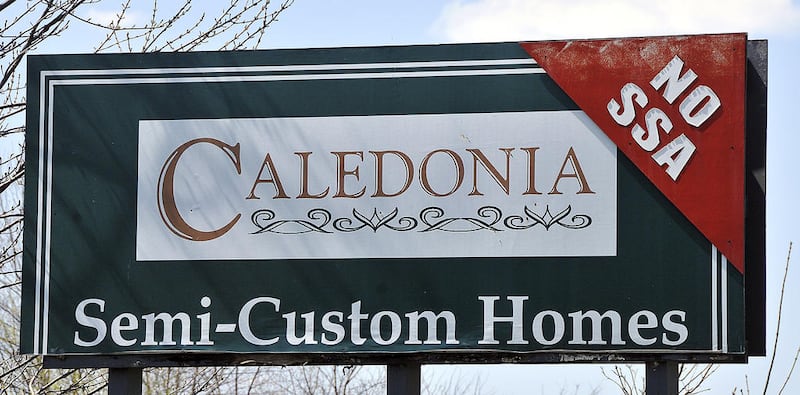A near 30-acre parcel near the Caledonia subdivision in Yorkville is becoming the latest tug-of-war between data center developers and city officials.
Green Door Capital, a private equity sponsor based in Chicago, is asking city officials to green light rezoning three parcels of land for their 130-acre “Meyer” data center proposal. The parcels are located south of Corneils Road and east of Beecher Road.
The three parcels, currently zoned multi-family, will need to be rezoned to general manufacturing for data center usage. The city’s 2016 Comprehensive Plan designates the parcels as suburban neighborhood, designated for single-family, detached residential homes.
City staff are favoring rezoning the two western parcels to manufacturing, but are initially favoring retaining the eastern-most parcel as residential because of its proximity to residential properties of the Caledonia subdivision, according to city documents.
“By preserving (its residential zoning), a substantial visual and spatial buffer would be maintained between the proposed manufacturing use and the adjacent residential area,” city staff state in city documents.
:quality(70)/cloudfront-us-east-1.images.arcpublishing.com/shawmedia/5C2JPB6O6JDS3JKC4X343JUA64.png)
Staff favor this option because city regulations require a 100-foot landscape buffer and a 500-foot building separation between any data center building and the nearest residential structure.
Green Door Capital, who have already purchased more than 700 acres in the city for data center development, including these three parcels, is looking for allies among city staff.
During an Economic Development Committee meeting on Sept. 2, while arguing for the eastern-most parcel to be rezoned, Green Door Capital representative Kevin Kearney reminded city staff that Green Door Capital brought the very first data center plans to Yorkville, the 228-acre CyrusOne data center campus.
“We don’t feel that it will prejudice or damage the concerns of the neighborhood to the east or any other residences, since those setback requirements will still be in place when an end-user comes in,” Kearney said during the meeting.
Kearney further argued that limiting the rezoned parcels to 100 acres is too small for a data center campus. He also said the eastern parcel is within Yorkville School District 115 boundaries while the other parcels are within Plano School District 88, regarding generating real estate tax revenues.
The utility tax revenues would still all go to Yorkville. City officials have previously estimated each individual data center building could bring in around $500,000 to $1,000,000 annually in tax revenues to the city.
That being said, the developers of the 1,037-acre Project Cardinal data center recently admitted the utility tax revenue generation would come in at a fraction of the originally estimated $100 million at full build-out.
City officials have not said how this computes into projections for total tax revenues created from other data center proposals in town.
During the meeting, city staff said they would favor rezoning if a development agreement stipulating a single-use data center and acknowledging a 500-foot setback was put in place. Green Door Capital said because no end-user has been lined-up yet they can’t make any agreements on final design plans.
Without an agreement in place, the city would just have to take the private equity sponsor’s word on respecting the required boundaries from residential areas.
The next step is to involve the public in the discussion. City staff is recommending Green Door Capital reach out and set up a meeting with the Caledonia subdivision homeowners’ association. City ordinance requires this occurs before the Oct. 8 public hearing during the Planning and Zoning Commission meeting at City Hall.
The city only mails out notices to residents that own property within 500 feet of a proposed development. Several residents have spoken out against this at city meetings, arguing far more people living in close proximity should be notified, not just those within 500 feet.
The “Meyer” data center proposal is part of the city’s overall plan to develop around 3,000 acres of farmland into data center campuses.
While residents have acknowledged the developments can provide extra revenue for the city’s coffers without increasing the population, several have said they do not want to live in a manufacturing hub.

:quality(70)/s3.amazonaws.com/arc-authors/shawmedia/0cef0bf9-a04e-4bb4-aea0-03d8ced01c00.jpg)